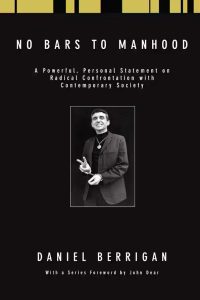WIPF & STOCK
Review by Brian Tanguay

Where does courage come from? Why do certain people sacrifice their liberty, and sometimes their very lives for a principle, while others remain silent? As I was thinking of such questions recently, I came across Daniel Berrigan’s book, No Bars to Manhood, published in 1970, a time of social upheaval in the United States. The Vietnam War raged on with no end in sight. Martin Luther King Jr. and Robert F. Kennedy had been assassinated. Racial unrest had roiled Detroit and Newark. University campuses were hotbeds of discontent, and in May of that year, four students were shot and killed at Kent State University by members of the Ohio National Guard. From the White House, Richard Nixon called for law and order.
Daniel Berrigan and his brother, Philip, are best known as members of the Catonsville Nine, a group arrested and imprisoned for burning draft files in Baltimore in 1968. This act of conscience against the Vietnam War was undertaken with full certainty that the law would come down hard, even on men of the cross. As he contemplated incarceration, Daniel Berrigan wrote: “I shall go neither in a spirit of alienation, of bitterness, nor of despair. But simply in the hope that has sustained me in better and worse days up to now.”
The book is organized into three parts, “A Spiritual Geography,” “Prophets and Prisoners,” and “Cornell.” The final section is Berrigan’s response to the unrest that erupted at Cornell University, where Berrigan was teaching, when Black students protested against perceived racism and the university’s reluctance to establish a Black Studies curriculum. When traditional means failed to move the Cornell administration, Black students engaged in direct action, occupying Straight Hall. White students associated with Students for a Democratic Society ringed the building in support as a weekend long standoff ensued. Most of the faculty, along with the administration and many parents, reacted with outrage against the Black students and demanded they be disciplined. Of this conflict Berrigan wrote, “It is simply that white men and their institutions are unready for any vision of man that is not white; they are unready for any culture that is not white, right, and therefore mighty.” Unlike faculty members at Columbia, Harvard, and the University of California-Berkeley who quickly lined up in support of student demands, the Cornell faculty resisted as long as they could.
The official reaction by Cornell is comparable to the reaction of some universities, particularly Columbia, to the wave of encampments and student activism that erupted over Israel’s US-backed genocide in Gaza; arguably, the backlash in 2024 was even more vicious than in 1969. Would Berrigan be surprised that some of our most prestigious universities, under pressure from politicians, donors, trustees, and the pro-Israel lobby, responded by abandoning principles of free speech and inquiry, academic freedom and shared governance? Understanding the workings of power as he did, it’s unlikely he would be surprised. He knew that, regardless of the organization, real courage is rarely found at the top.
Berrigan made a number of observations that are relevant to our moment. He had seen, he wrote, a society “that might have been great, according to its own rhetoric, turn murderously against those throughout the world to whom it once offered the fairest of hopes.” At that time most of the world regarded the United States with favor, and admired our political stability, but that well of goodwill has been squandered through hubris and lawlessness. Once taken for granted in many foreign capitals, the reliability of the United States as a strategic or economic partner is today a subject of debate and reassessment.
Society discovers itself most mercilessly, Berrigan wrote, in times of crisis. Gravitating inexorably toward the victims of absurd or bestial cruelty, the oppressed and downtrodden, Berrigan sought to build forms of community based on respect and understanding. Though he harbored few illusions about the essential nature of his country and its history, Berrigan embodied a patient, courageous brand of social activism, one that refused to yield in the face of daunting odds or fierce opposition.
Daniel Berrigan left an invaluable example of courage in action. No Bars to Manhood is a reminder that the courage to do the humane and morally sound thing is never out of season.
